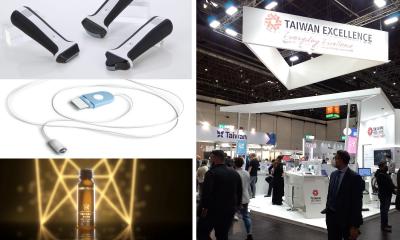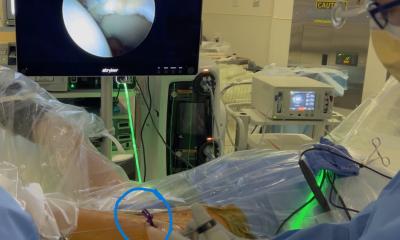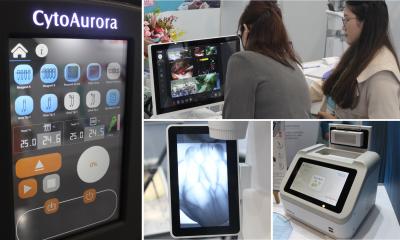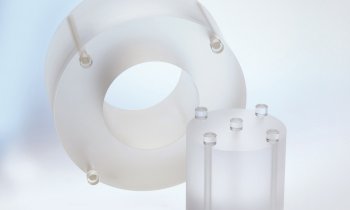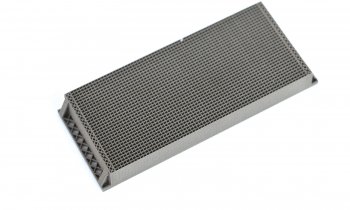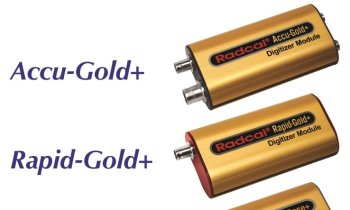Article • Company showcase: Medical Taiwan 2024
Manufacturers from Taiwan present innovative products
Handheld point-of-care diagnostics, magnetic endoscopy, AI-enhanced robotic surgery, smart patient information management, wireless minimally invasive surgery systems, and much more: At the Medical Taiwan Health & Care Expo in Taipei this summer, visitors had the opportunity to see innovative medical products and solutions across a wide range of specialties. We took a closer look at selected noteworthy companies and their products.
SyncVision Technology Corp.
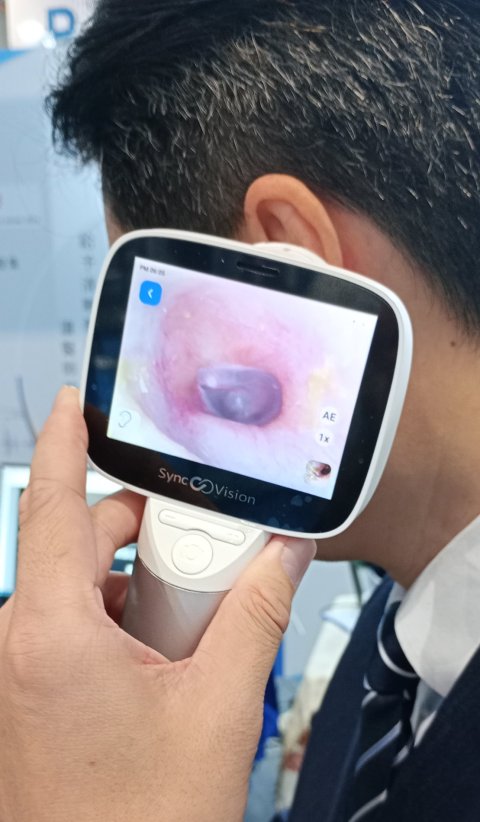
Photo: HiE/Behrends
With their award-winning handheld device, manufacturer SyncVision attracted many visitors to their booth. The digital inspection tool, called SyncKit, features a modular design approach to cover several medical specialties at once.
‘This device is specifically designed with telemedicine and home care in mind, for example for the elderly and patients living in remote locations,’ explained SyncVision’s General Manager Kuan-Hsien Chen. ‘By using different attachments, doctors can perform diagnoses for different anatomical sites, such as ear, throat and teeth. The device can also serve as a thermometer, or a stethoscope for lung and heart health assessment.’
Using real-time imaging and audio recording and result synchronisation, the SyncKit can be used for remote appointments, live discussions with physicians or tracking of health data. The modular design also reduces infection risk, the expert added.
Insight Medical Solutions Inc. (IMS)
The magnetic approach to endoscopy in the InsightEyes system from company IMS was also among the highlights of the three-day event. By using a handheld, joystick-like controller, doctors can steer a diagnostic capsule through a patient’s upper digestive tract.
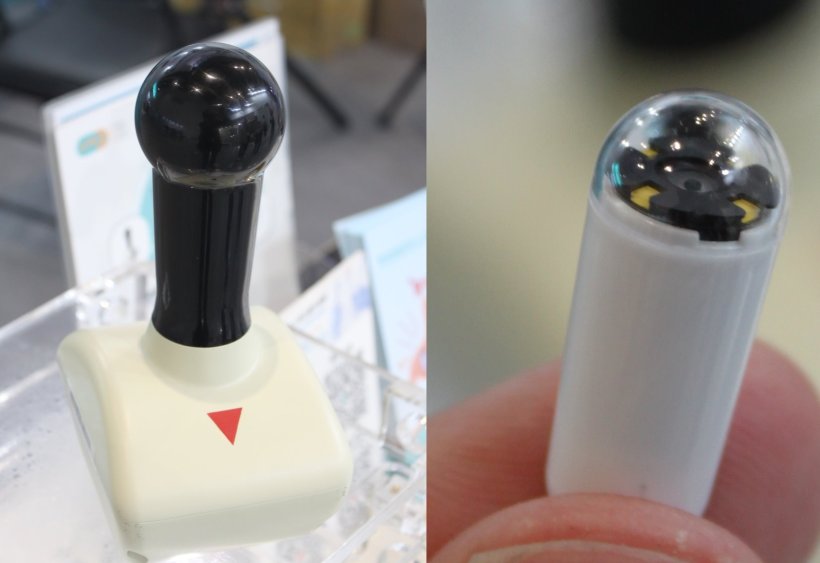
Photo: HiE/Behrends
The cable-bound capsule is designed for performing esophagogastoduodenoscopy (EGD) examinations without pain or discomfort, without having to resort to anaesthesia. Providing real-time video footage during the examination, the device also makes it easier for doctors to discuss diagnoses with their patients, as their ability to speak is not affected by ingesting the capsule.
BroadSims Inc.
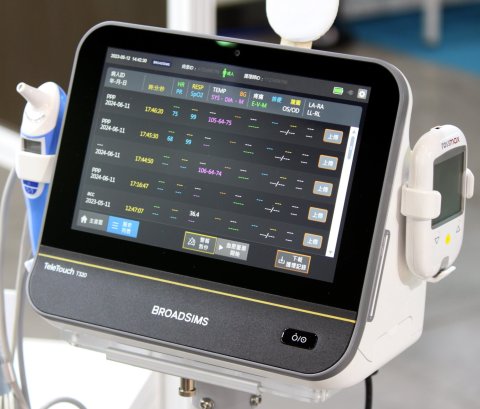
Photo: HiE/Behrends
A multimodal and multifunctional smart patient monitor was presented by BroadSims. The device, called TeleTouch, provides patient information on blood pressure and oxygen levels (SpO2), heart rate and body temperature. Built-in 5G capability enables high-bandwidth wireless network operation, while the 10″ screen and 4-hour battery life facilitate mobile use of the system, explained Alex Tzou, Director of Operations at BroadSims.
Add-ons can be connected via Bluetooth, expanding the diagnostic capabilities with point-of-care ultrasound (POCUS), glucose monitoring or patient weight measurement. ‘The system is designed to optimize workflows during at-home consultations, for example in remote areas,’ Tzou said, highlighting the device’s capabilities for video conferencing, multi-screen monitoring and assessment documentation via built-in forms.
EPED Inc.
Located in a futuristic operating room setting, manufacturer EPED had an impressive stage for showcasing their products: the stereotactic surgery navigation system Retina, and the robotic arm and AI-enhanced navigation system for brain surgery Eprob.
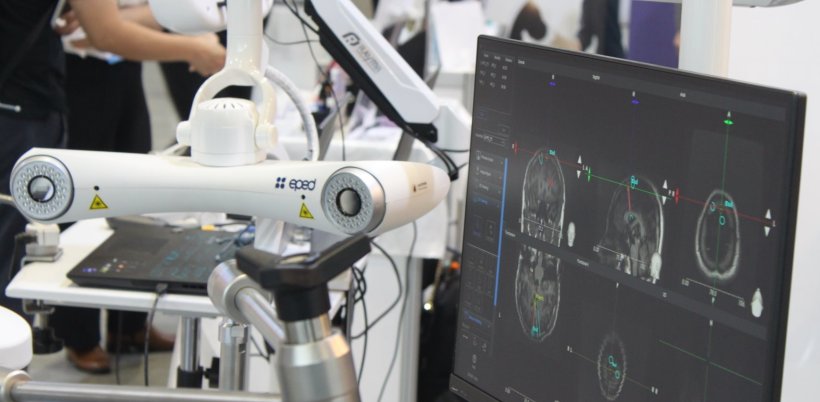
Photo: HiE/Behrends
The Retina system uses advanced tracking technology and integrated data from CT/MRI fusion imaging to determine surgical instrument positions during an intervention, EPED Regional Manager Henry Lin explained. ‘This reduces unnecessary tissue injuries and surgical complications, improving the overall surgical quality of minimally invasive surgeries,’ he added. Compatible with many instruments, the system can be used for a wide range of procedures, including neurosurgery, craniofacial, ENT, oral and maxillofacial surgeries.
The latest addition to the company’s product portfolio, the Eprob system provides 3D positioning assistance during neurosurgery, for example deep brain stimulation procedures, intracerebral haemorrhage clot evacuation and external ventricular drain. The combined setup of a robotic arm and imaging-based navigation system enables higher precision, smaller incisions during the minimally invasive procedures, Lin said, resulting in higher success rates and faster patient recovery. For additional benefits, the solution can be combined with the company’s Retina system.
Point Robotics MedTech Inc.
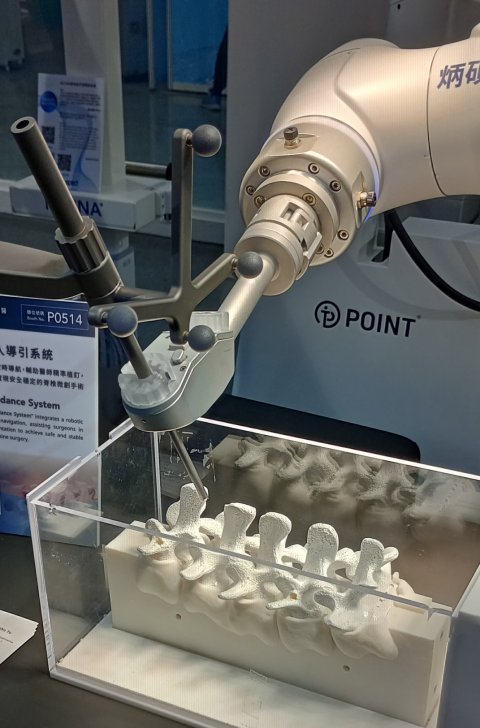
Photo: HiE/Behrends
The “OR of the future” display room, one of the centrepieces of Taiwan Medical, also featured the Kinguide Agile navigation system from company Point Robotics. With a stereotactic camera and a tool for pairing and position marking, it helps surgeons plan and perform minimally invasive surgery, said the company’s Chief Marketing Officer, Brad Lin. ‘For example, in spinal surgeries, the system provides AI-powered planning assistance for the placement of pedicle screws, based on 3D image reconstruction of the patient’s anatomy.’
This approach reduces radiation exposure for the operators and patients, increases accuracy in trajectory guidance and gives better overview due to the ability to switch between multiple viewing angles. Furthermore, the system is designed for compatibility with many established OR devices, enabling easy incorporation into existing surgical workflows, the expert concluded.
Leltek Inc.
A new product range of wireless ultrasound probes and software was presented by manufacturer Leltek. The LeSono series covers a range of different transducer shapes, for optimized use across sonography applications, Leltek’s Sales Manager Elroy Hsiung pointed out. While the phased array probe is designed for use in cardiac and abdominal diagnostics, the linear models shine in superficial regions, for example in breast or thyroid ultrasound or for MSK and vascular assessments. More probes are available, for example for OB/Gyn, urology, paediatric or ocular diagnostics.
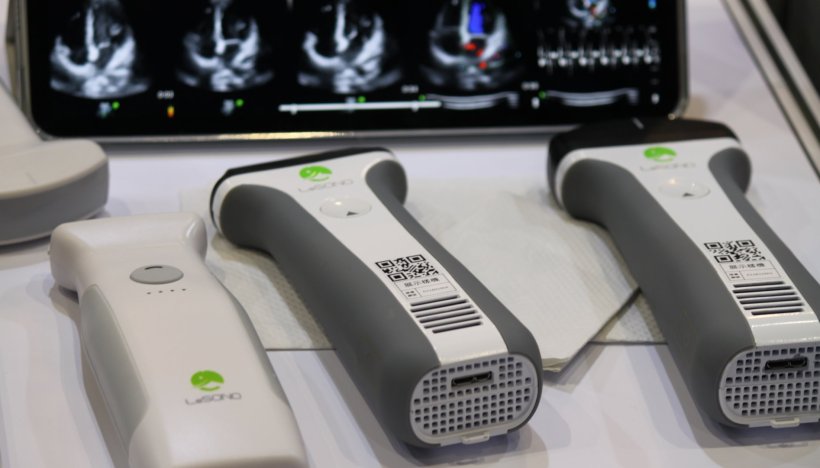
Photo: HiE/Behrends
The probes are compatible with DICOM 3.0 as well as any modern WiFi standards. A wide range of imaging modes, such as B-mode, M-mode, color Doppler pulsed wave (PW) and power Doppler allows for diagnostic versatility, with a battery life of 4 hours under active usage.
Maxima Biotech Inc.
An innovative approach to ultrasound technology was presented by manufacturer Maxima. Their cordless ultrasonic dissectors are designed to serve as valuable tools in minimally invasive surgery, said Mark Chu, from the company’s sales department. Through the use of the device's ergonomic triggers, the operator can dissect, cut and coagulate with the same instrument, allowing for more streamlined procedures.
Photo: HiE/Behrends
The device's greatest strength lies in its cordless design and focus on visibility and manoeuvrability, while the modular design with easy-to-assemble components enhances flexibility across applications, the expert explained. (WB)
26.07.2024



